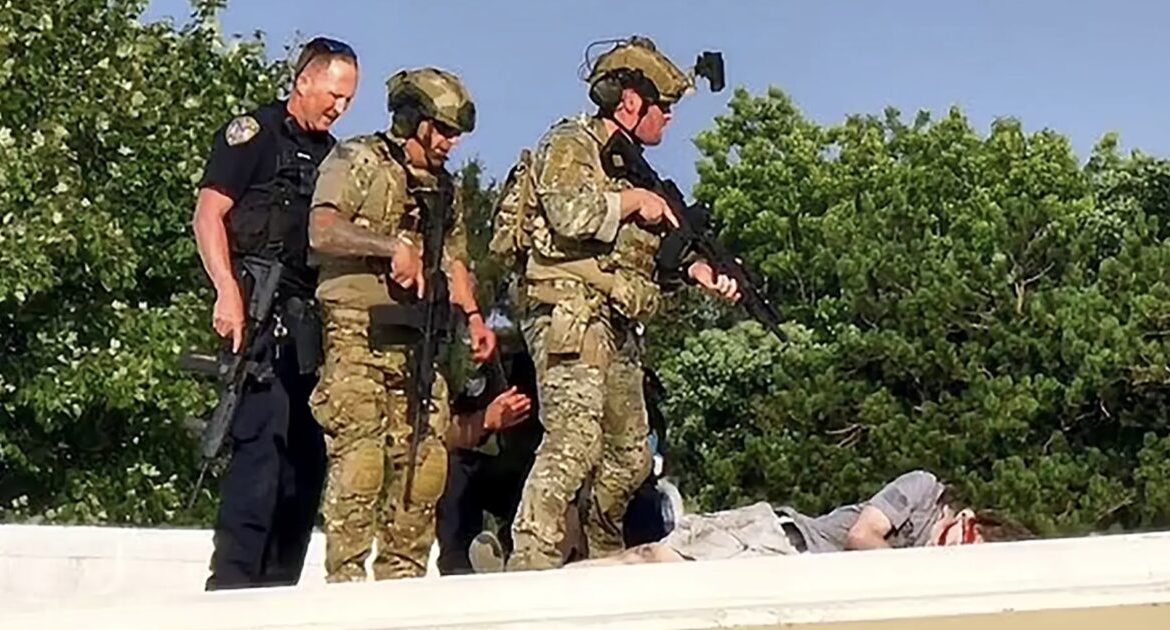
Secret Service Failed to Discipline Agent at Heart of Security Failures in Butler, PA – Agent Warned 25 Minutes BEFORE Shooting that Thomas Crooks was on Roof with Rangefinder


A damning new report from the Senate Homeland Security and Government Affairs Committee outlines the massive security failures one year ago in Butler, Pennsylvania, that nearly killed President Trump.
One of the most chilling findings in the report is that the Secret Service did not even discipline an agent who was made aware of the shooter 25 minutes before he fired eight rounds at the President and innocent rallygoers, but did nothing.
The 22-page report, which examines the “stunning failures by the United States Secret Service (USSS) that allowed then-former President Donald J. Trump to be shot on July 13, 2024,” was released on the one-year anniversary of the incident.
“One year later, the facts remain as chilling as ever: a former President of the United States and major party candidate was shot in the head at a public rally by an individual who was reported as suspicious and carrying a rangefinder to the Secret Service at least 25 minutes prior,” the report’s summary reads.
Another report from the Government Accountability Office reveals that the Secret Service was made aware of a threat against Trump’s life ten days prior, but did not alert the team responsible for securing Trump’s July 13, 2024, rally.
“What happened in Butler, Pennsylvania, was not just a tragedy—it was a scandal. The United States Secret Service failed to act on credible intelligence, failed to coordinate with local law enforcement, and failed to prevent an attack that nearly took the life of a then-former president,” Senate Homeland Security and Government Affairs Committee Chairman Rand Paul (R-KY) said in a press release.
“Despite those failures, no one has been fired. And we only know what little discipline was handed out because I issued a subpoena. That’s unacceptable. This was not a single lapse in judgment. It was a complete breakdown of security at every level—fueled by bureaucratic indifference, a lack of clear protocols, and a shocking refusal to act on direct threats. We must hold individuals accountable and ensure reforms are fully implemented so this never happens again.”
The report found that an unnamed Secret Service security room agent, “the individual in charge of communications,” who was partially identified as the Special Agent in Charge of the USSS Buffalo, New York, Field Office, was allegedly informed about a suspicious indivisual carrying a rangefinder 25 minutes before the shooting. That individual later turned out to be 20-year-old gunman Thomas Crooks.
“The job of a Security Room Agent is to be the conduit of communications between all entities involved in a protective site in order to ensure situational awareness of all parties involved in securing the event,” the report notes.
The agent decided to have the Secret Service counter-unmanned aerial systems agent relay this information via phone to the USSS Counter Sniper Response Agent, instead of his radio, and therefore, “the message did not go out to USSS post standers, counter snipers, and DTD shift detail,” the report states. The report also describes the operator, tasked with managing counter-unmanned aerial systems, as “inexperienced.”
According to the report, a Pennsylvania State Police (PSP) Officer told the PSP and FBI in a joint interview that he had notified the security room agent of the potential threat, but the agent appeared to ignore it. “It wasn’t like he rushed around or did anything,” the PSP officer said.
“After I said outside the perimeter, I got a distinct impression that there’s, like, a lack of urgency,” the officer told the FBI and PSP.
The agent appeared to corroborate the “lack of urgency” when he told the Committee, “For someone on the outer perimeter, there’s really only two assets available to us from a USSS perspective to dispatch… the [protective intelligence] response and the [counter sniper] response because they’re the only people who are capable of leaving the interior secure perimeter to go on the outside to look for somebody.” However, as noted before
The agent also gave conflicting narratives in both his interviews with the FBI and PSP and the Senate Committee, telling the Committee he heard about the shooter on the roof at approximately 3 o’clock, but telling PSP and FBI that he was never made aware of the shooter.
“By his own admission, he never had direct contact with local law enforcement throughout the day, and that his only method of communication with them was through the PSP officer in the USSS Security Room.cx Moreover, when asked by the Committee if he had viewed the PSP or Butler Emergency Services Unit (ESU) operations plan prior to the event, he stated that his first time seeing either of the operations plans was the day prior to his transcribed interview with the Committee.”
However, this agent faced no disciplinary action and was able to resign without any consequence last month, suspiciously about two weeks before the report was released on July 13.
Secret Service said in a document provided to the Committee, “After the Mission Assurance Inquiry review was completed, as part of the determination of which employees might face discipline, [the USSS Security Room Agent] was found not to be in violation of Secret Service policy. [The USSS Security Room Agent] retired on June 28, 2025.”
While six USSS personnel were suspended without pay earlier this month, “no USSS personnel were fired for their role in the planning or execution of the Butler rally,” the report states.
The post Secret Service Failed to Discipline Agent at Heart of Security Failures in Butler, PA – Agent Warned 25 Minutes BEFORE Shooting that Thomas Crooks was on Roof with Rangefinder appeared first on The Gateway Pundit.
